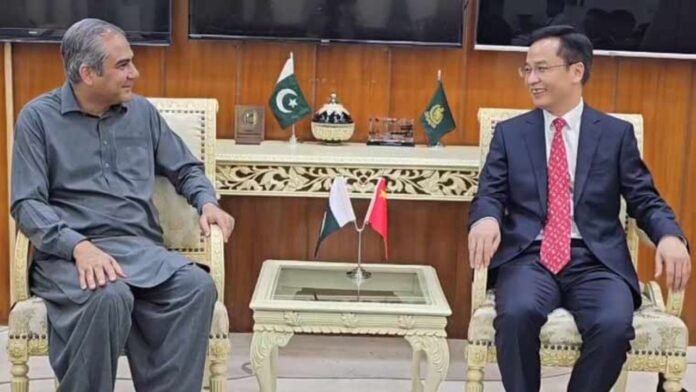Pakistan-China bilateral relations are further advanced, focusing on strategic areas of common concern. Growing bilateral ties came to the fore with the recent interaction between Pakistan Federal Interior Minister Mohsin Naqvi and China’s Political and Legal Affairs Minister Chen Mengwu.
Visit of the Delegation Pakistan-China
The high-level delegation of the People’s Republic of China, headed by Chen Mengwu, visited the Ministry of Interior of the Islamic Republic of Pakistan, a hallmark of further progress in the relationship between the neighboring countries. Mohsin Naqvi, who was hosting the delegation, expressed the need to extend working relations in all other areas. This reconfirmed Pakistan’s determination to remain in close standing with China and presented possibilities for working together in the future, especially in dealing with security issues and improving trade.
Counter-Terrorism Cooperation
Combating terrorism was another central point discussed during the meeting. Pakistan and China have common threats in this area, which makes it an essential area in their bilateral conversations. The region of Xinjiang has had a traumatic past with terrorist activities, and therefore, its history is quite beneficial for Pakistan. As Chen Mengwu stated, Xinjiang faces the understanding of terrorism, as all parts of the world do, but unlike the rest, it has been able to address the problem. Xinjiang’s anti-terrorism measures can offer many lessons to the north of Pakistan, especially the region of Gilgit-Baltistan.
Both countries also expressed interest in devising a plan that would include conducting active counter-terrorism operations with police and paramilitaries from Gilgit-Baltistan and forces from Xinjiang. This kind of cooperation seeks to improve both countries’ capacities to deal with terrorists and the protection level of the security discourse.
Enhancing Cross-Border Collaboration
Cross-border interaction aimed at tackling illegal trade and options for improving such connections were also high on the agenda of the meeting. Apart from Gilgit, Pakistan and China have a 600-kilometer-long border adjoining Xinjiang, which is a hotbed of illegal activities. Therefore, coordinated action should be undertaken by the two countries to root out such activities in the area. Minister Naqvi reiterated how vital fighting against smuggling must be, in any shape, primarily associated with illicit drugs, weaponry, and contraband trade.
This is in addition to China being part of CPEC, which crosses Xinjiang. This makes Xinjiang as strategically important as Tibet. Through border control and anti-smuggling policies, those two countries also advance the security of the effective execution of this megaproject, which promises well to both nations in the future.
Training and Capacity Building for Police Forces
This program will also allow Pakistani officials to obtain valuable experience in policies, counter-terror strategies, and law enforcement methods. Such capacity-building measures will enhance the working ability of Pakistan’s security forces and promote the working relationship between law enforcement agencies within Pakistan and China.
A primary goal of this particular interaction was to decide on a place for a pregnant woman. In the future, a Pakistani delegation, headed by the federal secretary of the interior, should go to Xinjiang to ask for such importation in the rest of the sectors with the core intent of security, law and enforcement, and cross-border integration management.
Pakistan’ss Strategic Advantage of Xinjiang
According to Minister Mohsin Naqvi, Xinjiang is an area of great value to Pakistan. As it is contiguous to Pakistan’s borders, the region is, therefore, one of the most important in all regional relations. CPEC is another factor that geographically fulfils, ensuring that Xinjiang remains critical. This mainly helps China access its markets more directly by enhancing Pakistan’s economy and trade development via the economic corridor that connects Gwadar Port in Pakistan and Xinjiang.
Future Perspective of Pakistan-China Relations
The meeting between Mohsin Naqvi and Chen Mengwu was a promising move to cement Pakistan-China relations further. The two leaders were optimistic and noted that they were looking to expand the horizons of cooperation, especially in security, law and order, and anti-terrorism. With aspirations and prospective interests, the Pakistan-China relationship is moving toward a higher evolution, providing a strong bond toward bright days ahead.
This serves as a timely ironic circumstance about the nature of relations and the two countries will cooperate to address problems on the regional and global levels.


